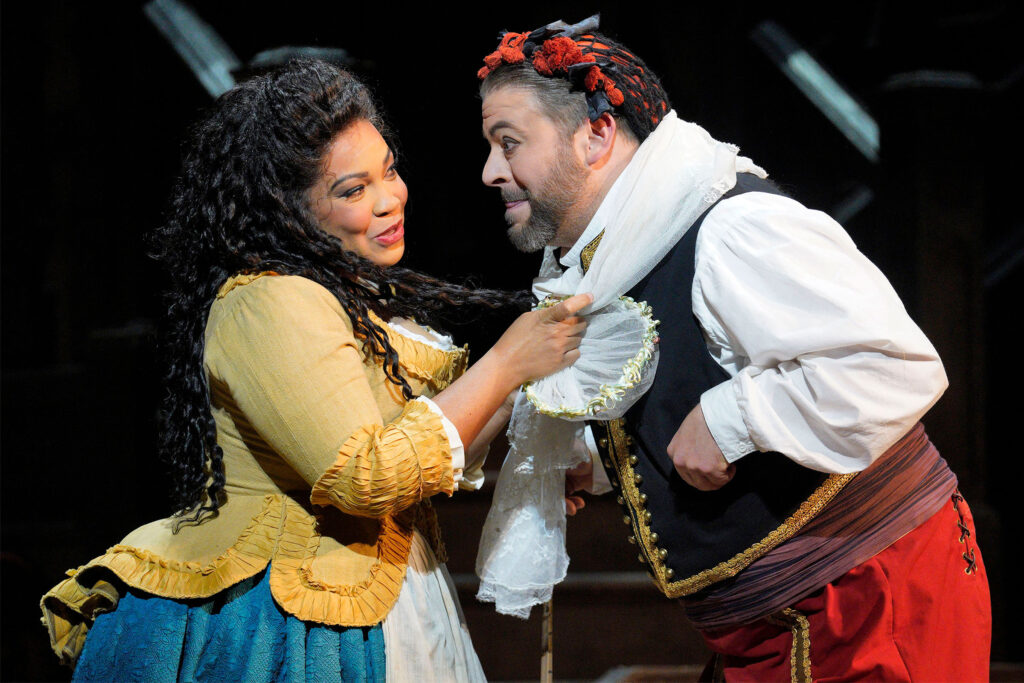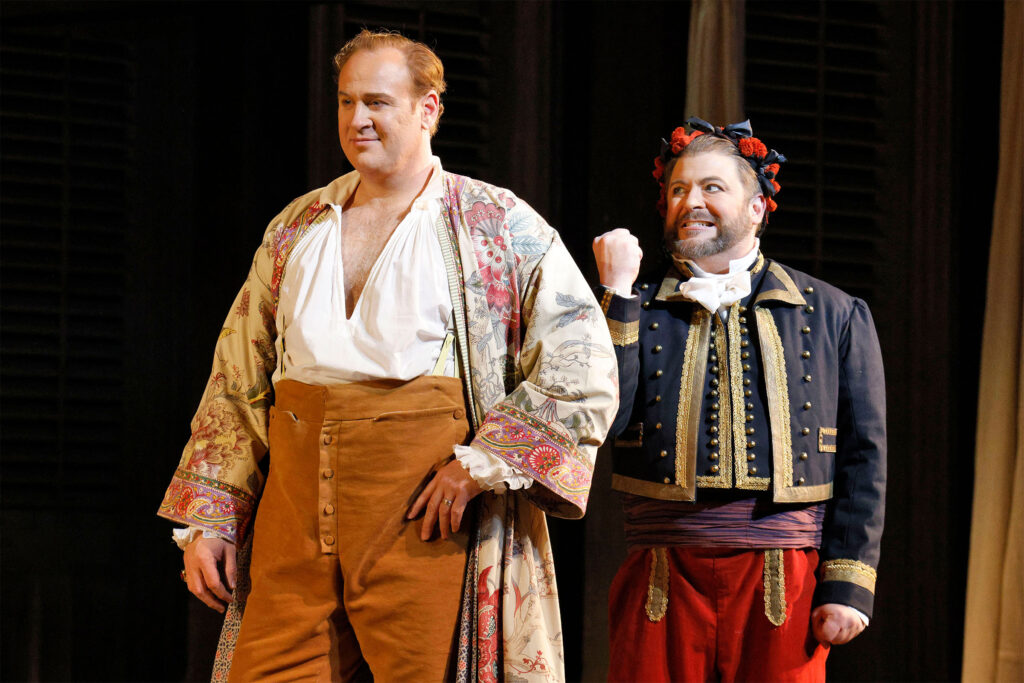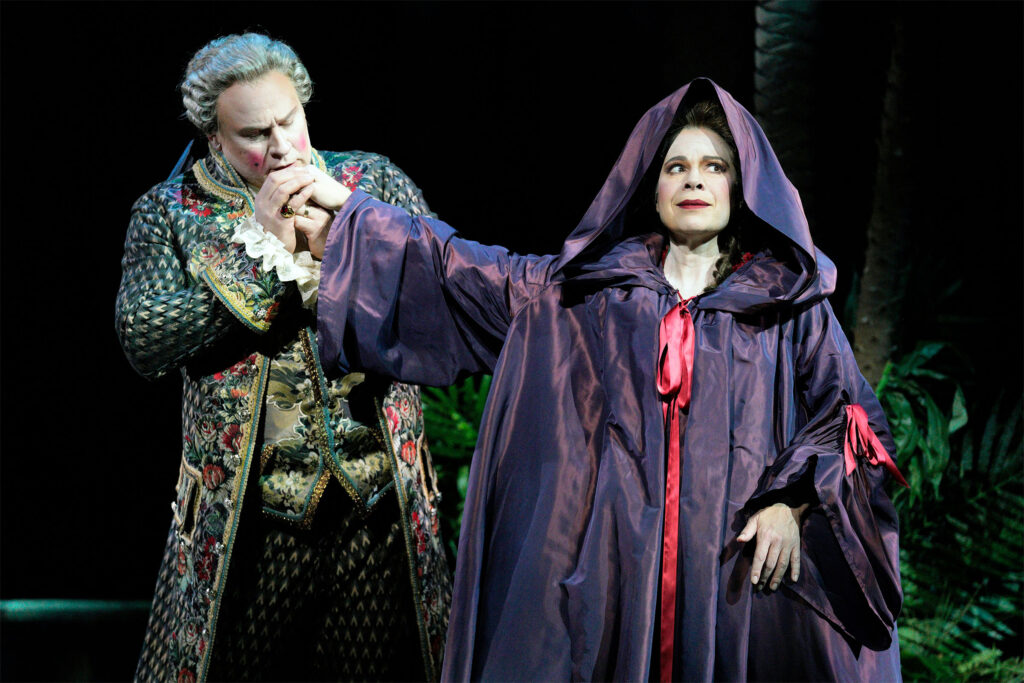Review: LA Opera’s ‘The Marriage of Figaro’ Invokes Mozart at His Most Triumphant

The following review is based on the Thursday, February 16th performance.
If there was a Mount Rushmore for operas, one could be quite certain that Wolfgang Amadeus Mozart’s The Marriage of Figaro would be among the elite four representing the genre. The late-18th century, four-act opera buffa written by Lorenzo da Ponte, and composed by Mozart, deserves without exception not only a superstar cast, but audacious behind-the-scenes creatives and curators of this timeless art piece. Fans of this Italian masterwork can rejoice in knowing they absolutely get both in LA Opera’s 2023 production at the Dorothy Chandler Pavilion, which can be enjoyed for only three more dates — on Sunday, February 19th at 2 pm, followed by Thursday, February 23rd at 7:30 pm, and finally Sunday, February 26th at 2 pm.

LA Opera’s diligence has resulted in a must-see extravaganza that is delightfully forward-thinking for its time, spotlighting a thankfully antiquated practice, and unfurling insightful motifs about class imbalances, inequities between the sexes, and an oftentimes hilariously slapstick interplay between sex-hungry men and resourcefully defiant women. Harpsichord-supported recitatives, along with both light-hearted and deeply poignant arias, entertainingly fuel Figaro from start to finish.
For those unaware of feudal, pre-Revolutionary France, the mores — specifically the driver of Figaro’s premise — might be head-scratching. Nonetheless, a custom termed droit du seigneur existed, the exercising of which would enable a lord to have sexual dominion over the body of a vassal’s bride on her wedding night. Something like that is inconceivable today; however, in the plot, Count Almaviva has plans to bed his manservant’s (Figaro) bride-to-be, Susanna, who also happens to be the maid of the Count’s wife: Countess Rosina. As one can surmise, the Count’s dastardly desires don’t sit well with neither Figaro, his betrothed, nor the Countess for that matter, who has been emotionally ravaged by the Count’s infidelities. The trio unite in their common goal to thwart the Count, and what follows is an enthralling salvo of diversionary tactics, traps, the secret swapping of identities, sometimes inopportune timing, misunderstandings, and, lastly, an against-all-odds redemption — perhaps an auspicious consequence of Age-of-Enlightenment principles that percolated and portended a more progressive future.

This version of The Marriage of Figaro initially premiered at Paris’ Théâtre des Champs-Elysées in late 2019. Many of its noteworthy personnel have returned, including heralded film director James Gray (We Own the Night, Ad Astra, Armageddon Time) and French fashion designer Christian Lacroix known for his ornamental haute couture (e.g., vintage ball gowns). Conspicuously, Gray has the wherewithal to resist the temptation to put his fingerprints all over Figaro; instead, he gets out of his own way, ensuring that the narrative developments succeed on the grounds of their own lucidity, which stokes the audience’s unremitting investment despite the three-hour-and-forty-five-minute runtime. To this aim, Lacroix similarly excels at using his textiles to stir and satiate expectations from a visual standpoint.
Santo Loquasto returns as set designer whose immersive scenery impresses with each subsequent act, culminating in a garden; the sets are also effective in complementing the larger-than-life characters who benefit from York Kennedy’s handsome lighting. At the helm of it all is conductor James Conlon who is imperturbable as he guides Figaro with a steady hand, allowing musical passages to breathe and be absorbed into the observer’s consciousness. Conlon is also cognizant of avoiding lulls by keeping the score moving and engaging so that attention spans don’t wane. The performers, likewise, sustain interest by not only singing majestically, but by being equally proficient as actors who expertly harness their non-verbal expressions.

As the philandering Count, Grammy Award-winner Lucas Meachem makes for a domineering adversary whose persona’s one-track mindedness, jealousy, and suspicions are exploited by those who justifiably oppose his will to defile Susanna. This, of course, enrages the Count who, with saber in hand, sings of his vengeful intentions in “Hai già vinta la causa – Vedrò mentr’io sospiro.” The imposing Meachem, whose mesmerizing character is introduced in a colorful robe and red shoes, excels at not only emoting scorn, but frustration (often communicated comedically), and even shades of repentance with his formidable baritone range.
Opposing the intentions of Meachem’s Count are bass-baritone Craig Colclough as the spirited Figaro, soprano Janai Brugger as the chaste and courageous Susanna, as well as the preeminent Ana María Martínez as the disapproving Countess and accomplice to the aforesaid two. As resounding as his vocals are, Colclough earns acclamation for his presence and physical comedy, particularly in scenes where his character’s schemes against the Count are exposed or when he is abruptly caught off-guard. At his core, Figaro is a good man, but not as unimpeachable as Susanna, and is prone to feverishly jumping to conclusions about the supposedly deceitful nature of all women, like in “Tutto è disposto – Aprite un po’ quegl’occhi;” needless to say, the aria is perfectly executed by Colclough. Brugger is a consummate professional in her own right as she cogently paints Susanna with an innocence that isn’t mutually exclusive of a galvanizing bravery to outwit the Count. Brugger duly recognizes the significance of her character who is at the center of the conflict, and with her full commitment to each scene and evocative voice, is a major reason why this production rises to the next level.

Martínez, too, gives a remarkable performance as the high-ranking female aristocrat who, in lieu, of protracting the chasm of privileges between herself and Susanna, refreshingly becomes a friend and mentor throughout. Vocally, Martínez is again in fine form, refusing to rest on the laurels of her already fortified legacy and rings out a mellifluence of notes that signify her character’s disenchantment and despair with the Count during two plaintive arias: “Porgi amor qualche ristoro” and “Dove sono.”
In addition, making her stellar LA Opera debut is Rihab Chaieb, who playfully and fearlessly portrays Cherubino, a boy page (a female is traditionally cast in this role). As a young seducer who appears when least expected, Cherubino is perpetually lovestruck or lovesick, and behaviorally mirrors the Count in some ways (whom he butts heads with) despite being much more endearing. Chaieb’s rendering of Cherubino contributes to much of the high jinks in the opera, and yet Chaieb is also capable of being heart-rending as in when her avatar lovingly serenades Martínez’s Countess in “Voi che sapete che cosa è amor.” Among Cherubino’s conquests is Barbarina, who is divertingly depicted by Deepa Johnny. The same goes for Alan Williams’ underrated performance as Barbarina’s father Antonio, a doddering and drunken gardener, who becomes increasingly exasperated with Cherubino.

Furthermore, Marie McLaughlin’s Marcellina, an older middle-class woman who attempts to coerce Figaro’s outstanding debt to her in exchange for the contractual promise of marriage, and Kristinn Sigmundsson’s Doctor Bartolo, who is Marcellina’s former employer, flourish as a quirky and misguided coupling with their own riveting side narrative and surprising reveal. McLaughlin especially makes an impact with her character’s outlandishly funny, barb-filled duet with Brugger’s Susanna in Act I’s “Via resti servita, madama brillante.”
Two other supporting players include Rodell Aure Rosel, who fills the shoes of Don Basilio — the Count’s lackey — with his fantastic comic sensibilities, and Anthony León, who is excitable and hilariously bewildered as Judge Don Curzio, the presider over the dispute between Figaro and Marcellina. Both have indeed proved themselves to be mainstays for years to come. Finally, deserving of plaudits are the LA Opera chorus members, led by Jeremy Frank. The group of mostly women earn smiles every time they take the stage and pay tribute to the Count and Countess with a cornucopia of flowers.

With a story that is propelled by righteously motivated, rousing, and uproarious subterfuge, LA Opera’s 2023 presentation of The Marriage of Figaro examines its myriad of lushly written characters through the lens of a non-absolutist realism, where faults might bubble to the surface but an alerted intrinsic civility has the triumphant potential to parry inegalitarian outcomes between the sexes and social ranks. The all-star team responsible for the staging and music, in concert with a superb cast that hones in on the socially conscious layers conceived by Mozart and da Ponte, have crafted a propulsive production its progenitors and succeeding generations can be proud of.
Note: For the three remaining performances of The Marriage of Figaro, musical director James Conlon will continue with his pre-show lectures approximately one hour before showtime on the 2nd floor (in Stern Grand Hall) of the Dorothy Chandler Pavilion.
For more information on LA Opera’s production of The Marriage of Figaro, and to purchase tickets to the final three performances, please visit: laopera.org




































































































